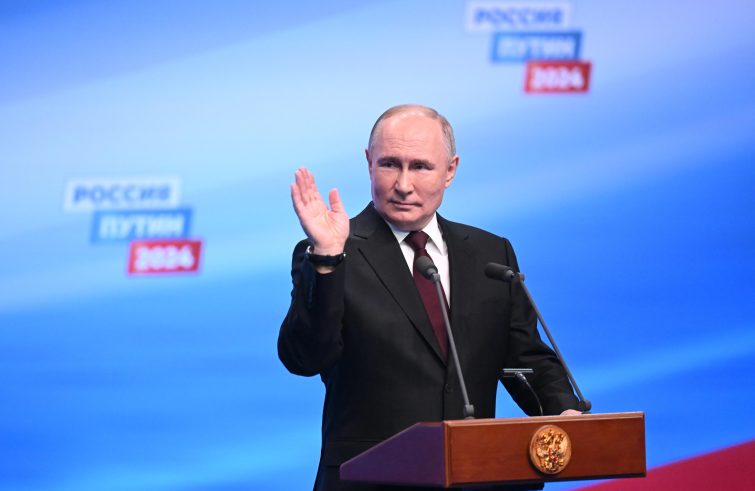
Vladimir Putin has won 86.5% of the vote in the Russian Federation’s three-day election. He is on his way to a fifth six-year term in office, with results that recall those of a true dictator. The gap separating him from his pretend competitors is huge: 5.09% of the vote went to Nikolay Kharitonov (Communist Party), 4.21% to the young “anti-war” candidate Vladislav Davankov (New People’s Party), and Leonid Slusky (LDHR, Liberal Democratic Party of Russia) with 3.04% of the vote.
The election results are far from realistic, but we already knew that.
On 15 March, the first day of voting, the President of the European Council, Charles Michel, wrote ironically on X: “I would like to congratulate Vladimir Putin on his landslide victory in the elections that began today. No opposition. No freedom. No choice.” In the previous presidential election in 2018, Putin had won 76.69% of the vote.
Yesterday, Sunday 17 March, images of courage coming in from the well-known media channels Doxa, Meduza, Ovd-Info had raised hopes that the outcome of the vote would undermine the dictator’s success even slightly. The X hour finally arrived at 12am, when the “Noon against Putin” protests began on the initiative of Yulia Navalanaya, widow of the opponent killed on 16 February, namely to meet in front of the polling stations and invalidate the ballot paper by writing the name of Alexsey Navalny. People were seen queuing, particularly in Moscow and St Petersburg, but there were no signs of a popular uprising. Obviously, we will never know the exact number of invalid ballots.
According to official figures, Putin won 85.13% of the vote in Moscow, with Davankov winning only 6.65%. Brave voters who kept their identities hidden circulated photos of their spoiled ballot papers on Telegram accounts. The longest, extremely long lines, were seen outside Russian embassies all over the world. Especially in Berlin, where Navalny’s wife voted – and which is now the headquarters of the opposition abroad – in Yerevan, Armenia, where thousands of Russians flocked in the first months after the war broke out, and in Phuket, Thailand. As polls closed at 8pm in Berlin, protests erupted at the long queues of people who were prevented from voting. The Russian Foreign Ministry said the turnout at polling stations abroad was ‘unprecedented’, with more than 372,000 people voting. Within hours of the polls closing, the “Russian election monitor” published a number of exit polls conducted outside Russian embassies in Europe. Accordingly, Putin was reported to have won 16 percent of the vote (3 % in The Hague, 5 % in Istanbul, 6 % in London, 10 % in Berlin), while the leading candidate was Vladislav Davankov with 49 %. But the official online voting data contradicts these claims, with Putin at 89.1%, Davankov at 4.4%. Reports of fraud and irregularities have spread on social media. The Free Russia Foundation issued a strong statement: “There were no observers, there were widespread raids, and there was strict control over all news coverage”. Meanwhile, 86 people were arrested yesterday in 12 different cities across the Federation.
The election had a record turnout of around 65%, which Putin attributed in a press conference last night to “the gravity of the current situation” and the fact that “Russia is defending its progress with weapons in its hands.” He went on to say that the main goals of his forthcoming six-year term would be “the achievement of the objectives of the special operation and the strengthening of our defence capabilities and armed forces.”
The only element of Putin’s press conference that immediately reverberated on Russian channels was the fact that he mentioned Aleksey Navalny’s name for the first time, in response to a question about the death of his opponent: “There have been other cases of people dying in prison. Has this never happened in the United States?” he shot back, publicly stating that he had agreed to exchange Navalny for Russian prisoners in Western countries as long as he did not return to Russia. At the press conference, he also lashed out at French Prime Minister Macron: “Sort out your national problems.”
The Russian election results made headlines on Sunday: “Putin claims landslide in Russian election and scorns US democracy”, headlined the BBC; El Pais underlined “Putin adds high turnout to election sharade.” The Washington Post’s headline is a tribute to the opposition: “Russian voters, answering Navalny’s call, protest as Putin extends his rule.” For Le Figaro, “Re-elected amidst raging war, Putin prepares to strengthen the ‘vertical of power'”. Putin made front-page news a few hours later on Sunday evening on the online news site of the German newspaper Die Zeit with the comment: “With the sham elections, the Russian president is preparing for the final battle against the West. His propaganda will exploit the result as an endorsement of the war.” But Monday morning, the Russian autocrat’s victory is no longer front-page news.












